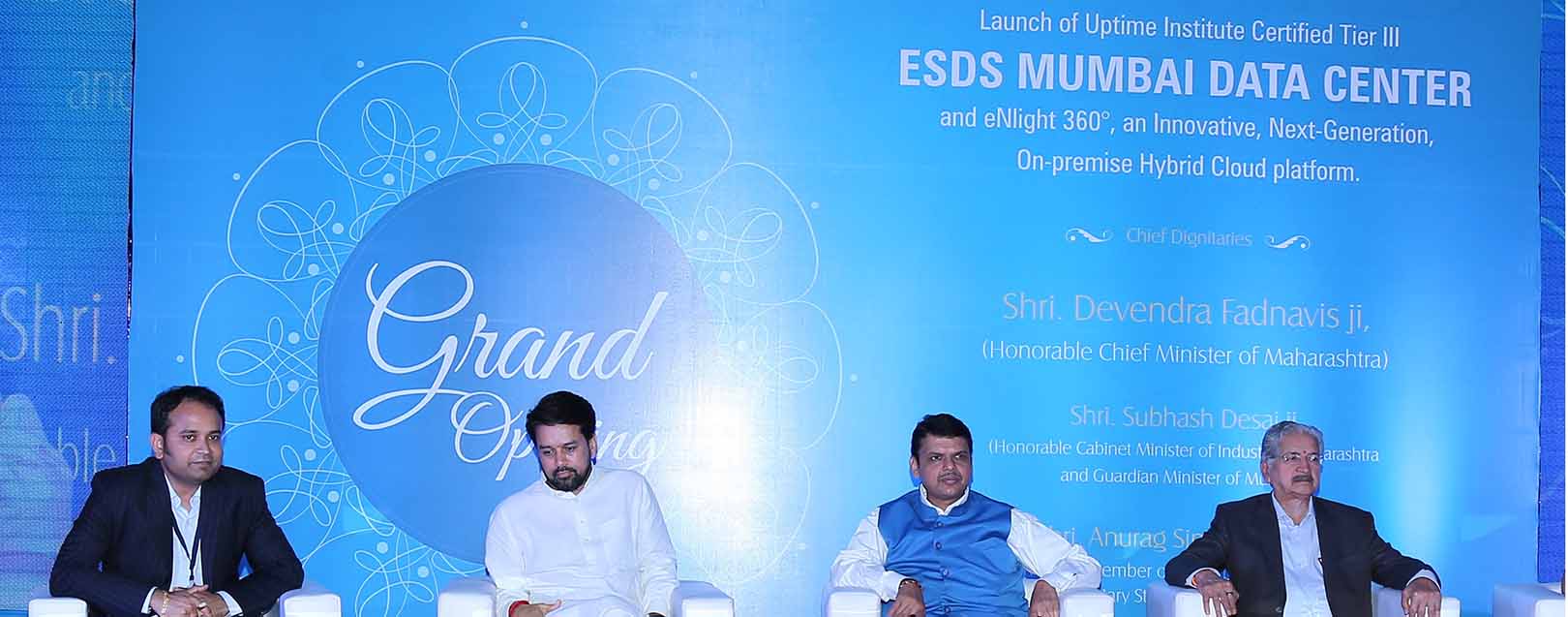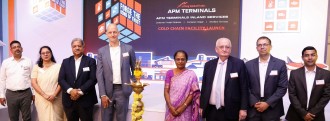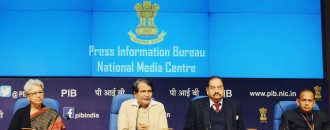
Maha-CM reaps praise at ESDS’s Cloud launch
Sairaj Iyer | The Dollar Business
(An exclusive story by The Dollar Business Bureau)

(L-R) Subhash Desai, Minister for Industries, Maharashtra State; Anurag Thakur, MP, Chairman for Jt Parliamentary Committee on IT, and Secretary BCCI; Devendra Fadanvis, Chief Minster Maharashtra; Piyush Somani, CEO, ESDS at the ribbon-cutting ceremony of ESDS’ facility at Mahape
Devendra Fadanvis, Chief Minister of Maharashtra reserved kind words and reaped praise on ESDS and their CEO Piyush Somani. The Maha CM was inaugurating Exuberant Support for Data Services’ (ESDS) grand launch of its datacenter. The CM was joined by Anurag Thakur, Member of Parliament; Subhash Desai, the Industries Minister and Guardian Minister for Mumbai City, Mandatai Mhatre, Member of Legislative Assembly and Sudhakar Sonawane, the Mayor of Mumbai.
The datacenter facility at Mahape is a part of a Rs. 200 cr investment that ESDS would be making, as part of an MoU with the State Government of Maharashtra. The 80,000 sq.ft uptime certified facility is auto-scalable, offering cloud facilities on a pay-per-use consume model. The launch marks a ramp in ESDS’ total datacenter footprint to 100,000 sq. ft floor space across Mumbai and Nashik. The Nashik-headquartered company also offers datacenter on lease in the UK. ESDS’s launch had the CM and visitors in rapt attention, as the CM hinted that a partnership with ESDS is on the cards, to amplify success of programs such as Make in India, Digital India, business growth and project India.
ENLIGHT-ening CLOUD
ESDS’s new cloud datacenter helps organizations innovate and comply with industry benchmarks. The heart of ESDS’ offering is the eNlight 360 degree feature. The feature has been patented with the US patent office, and offers horizontal and vertical scaling that ensures compute resources in the least latency. The feature helps ecom players strategically serve customers during a surge/hike. Piyush Somani, CEO at ESDS shares an example. “Imagine somebody is getting married, and capacity has been planned for 500 guests, but what happens when 1000 guests turn up?” Although hall-facilities would be planned for handling 700 guests, facilities such as serving food, and other refreshments would lead up to a paucity and thereby visitors would be affected, a similar way how web-visits get affected.
Somani highlighted that after acquiring a patent from the US-patent office, ESDS has earned revenues of Rs. 100 cr within 4 months. The cloud facility does real-time adjustments and uses technology-calculations to arrive at optimal scalability and a pay-per-use model. The company has on date 35,000 customers, 2 million websites and portals hosted. “Approximately 2% internet is managed by us. We could achieve this feat because of the people. The love, passion and focus on technology has always been so heavy that we never wanted to be a BPO or a manpower company,” says Somani.
FOCUS ON G2C SERVICES
Anurag Thakur, the Member of Parliament, and Secretary, BCCI offered a glimpse on the need to focus on Government to Consumer services. “Technology has not only transformed our lives, but has become a way of living. Right from the alarm on our smartphone, to our gym exercises, GPS drives, Google hangouts for meetings, we have become tech-savvy and our devices and data reside on the cloud. It is great to note that data from the Mudhra bank and Standup India campaign would be hosted at this patented technology of ESDS,” he said. Coincidentally, Thakur is also the Chairman of the Jt. Parliament committee on IT.
There is a direct connection between the Government and consumer services in ESDS. Even the PM uses digital technologies such as Twitter to reach out to customers. Sharing statistics on the import and the growth of electronic devices, Thakur shared that sectors such as Telecom; Laptops, Desktops & ICT; LED TV and Smartphones; and Consumer Electronics were each representative of a market of $30 bn. The Minister also pointed out that Innovative companies, would put India on the global map and fuel concepts such as Make-in-India. Although, Maharashtra, by virtue of being the financial capital has a good mix of data-centers and hosting facilities, schemes such as Meghraj, the government’s hosting facility has a sizable number of takers as per a Deity report. The Minister points out that the Union Ministry’s technology support schemes such as Meghraj, find limited takers and support from state governments.
DATA SOVEREIGNITY

(L-R) Piyush Somani, CEO, ESDS; Anurag Thakur, MP, Chairman for Jt Parliamentary Committee on IT, and Secretary BCCI; Devendra Fadanvis, Chief Minster Maharashtra; Subhash Desai, Minister for Industries, Maharashtra State during an official interaction at the launch of ESDS’ facility at Mahape
Data outside the country raises data sovereignty issues. According to Devendra Fadanvis, the second-youngest Chief Minister of Mahrashtra, who has also been credited with getting multi-billion dollar contracts at the Make in India week, Mumbai, digital and cloud services will reduce India’s import of electronic gadgets, and help address data sovereignty issues. Domestic data-centres such as the ones built by ESDS, are not only helpful in upscaling governance initiatives but also towards ambitious concepts such as Smart-City. The Maharashtra government has proposed ten cities in its proposal of smart-cities, and cloud services would form the backbone.
Datacenters also help reach and connect with people, thereby help fuel the nation’s vision. The CM also expressed a strong desire for entrepreneurs such as Piyush Somani to work with the government in facilitating the governance aspects within India. The state government has made close to 150 services available online under a program called ‘Aaple Sarkaar’ to facilitate better governance. “By October, we will have 250 government services online. I visualize a day when no single person will visit a government office. We are working on aspects such as creation of payment gateway, which would be available through the mobile app, within this year. But, all these needs big data storages. Cloud computing and data is the key to all these services,” says Fadanvis.






 to success.
to success.